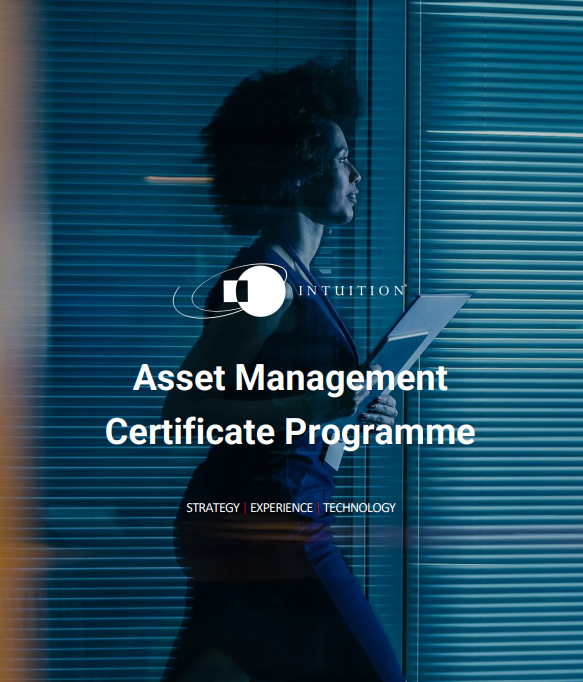What skills will Asset Managers need in 2025?
In an era characterized by rapid advancements in technology, evolving regulatory frameworks, and a growing emphasis on sustainable investing, the asset management industry faces a series of challenges and opportunities. This kind of backdrop sets the stage for a discussion on the skills that will give professionals across the asset management industry (front office, business functions, and back office) the most chance of success in 2025, emphasizing a blend of analytical proficiency, technological fluency, and acute awareness of asset management risks.
In 2025, the industry will need individuals who are not only knowledgeable in traditional financial principles, but also equipped to navigate the intricacies of modern markets with agility. The focus on analytical proficiency and technological fluency, understanding of complex financial instruments, strategic asset allocation, and portfolio construction, alongside risk management and regulatory compliance, outlines a clear learning path for aspiring asset managers.
***
Tailored for wealth and investment professionals, this accredited programme offers hands-on learning across core topics like equities, fixed income, and risk management—empowering you to make informed, impactful decisions.
Download our brochure to learn more.
***

Understanding the evolution of asset management
The asset management industry is undergoing a transformation, influenced by several key factors:
Digital transformation and technological adoption:
Shift to digital-first mindset: The industry is moving from a traditional, people-centric approach to a digital-first strategy, incorporating advanced technologies to enhance operations and client services.
Growth in assets under management (AUM): With AUM expected to reach $145.4 trillion by 2025, the adoption of digital technologies is becoming critical for managing this growth efficiently.
Areas of technological transformation: This includes the automation of back-office operations, the integration of AI and machine learning for predictive analytics, and leveraging big data for strategic insights.
Sustainable investing and market diversification:
Evolution of sustainable investing: The concept of sustainable investing is broadening, with investment strategies increasingly incorporating various goals that align with environmental, social, and governance (ESG) principles.
Expansion into private credit and alternative investments: Those involved in asset management are exploring new territories such as leveraged finance, corporate lending, and asset-backed finance, providing a wider range of investment options.
Innovative product development: To attract investors and compete effectively, modern finance professionals are developing and adjusting products to meet diverse investor needs, including those focused on sustainability and impact.
Technological and market innovations:
Advancements in asset management systems: The future of asset management will be supported by integrated systems that offer asset tracking, maintenance scheduling, asset lifecycle management, and enhanced regulatory compliance, all powered by cloud-based infrastructure and accessible via mobile.
Benefits of asset management software: Implementing advanced asset management solutions will lead to increased productivity, cost savings, reduced risk of errors, and streamlined decision-making processes.
Embracing emerging technologies: Professionals involved in asset management are keen on investing in emerging technologies such as Generative AI (GenAI), with a cautious approach to ensure effectiveness and compliance.
These developments underscore the dynamic nature of the asset management industry, highlighting the importance of staying abreast of technological advancements, understanding the evolving landscape of sustainable investing, and adapting to market innovations for continued success.
Are you reframing the future of asset management or is it reframing you? (EY)

Technological proficiency and data analysis
In the realm of asset management, the need for both technological skills and analytical proficiency is reshaping the industry’s landscape. The integration of these skills is now imperative for those aiming to excel. This section examines the critical aspects of technological proficiency and data analysis, emphasizing their significance in asset management.
Automation and AI in asset management:
Back-office efficiency: Automation of back-office operations significantly reduces manual workloads, enhancing operational efficiency and accuracy.
Advanced risk assessment: AI and machine learning (ML) technologies enable sophisticated risk assessment methodologies, facilitating nuanced market trend analysis and offering predictive insights that are vital for strategic decision-making.
Generative AI: Despite its rapid adoption, the integration of Generative AI in wealth and asset management necessitates a strong relationship with human oversight to ensure accuracy and governance, highlighting the technology’s role in operational efficiency improvements.
Data analytics for strategic insights:
Market and investor behavior insights: Big data analytics play a pivotal role in providing deep insights into market trends, investor behavior, and critical economic indicators, empowering finance professionals with the information needed to make informed decisions.
Data-driven decision making: The reliance on data analytics and AI for making data-driven decisions is identified as a top trend, with professionals prioritizing the integration of data sources and improving transparency through such technologies as machine learning and blockchain.
Challenges and skills in technological integration:
Navigating challenges: Asset management technology faces a range of challenges, including data security, regulatory compliance, technological integration, data quality, and bridging skill gaps. GDPR in the European Union imposes restrictions on automated decision-making, which necessitates a more nuanced approach to technology adoption.
Skill development: The digital transformation in asset management underscores the need for digital proficiency and technological savviness. Skills in leveraging CRM systems, data analytics, social media platforms, and providing innovative solutions are essential. Additionally, Google Data Analytics and IBM Data Science programs highlight the importance of skills in data analysis, machine learning, Python, SQL, and data visualization for professionals in the field.
This analysis emphasizes the need for professionals not only to embrace technological innovations, but also to cultivate a deep understanding of data analysis and its applications. The joining of these skills will be critical in navigating the complexities of asset management in 2025 and beyond, ensuring that professionals are equipped to meet the evolving demands of the industry.
How technology will redefine relationships with asset management clients (Deloitte)

Risk management and compliance awareness
The significance of Risk Management and Compliance Awareness in relation to asset management cannot be overstated. With the asset management landscape in 2024 presenting a series of challenges and opportunities, professionals must navigate a complex regulatory environment while ensuring the resilience and integrity of their operations.
The following points highlight the essential aspects of risk management and compliance in asset management:
Digital transformation and regulatory compliance: Asset management firms are increasingly adopting digital operating models to enhance their resilience against uncertainties such as inflation, interest rates, and supply chain disruptions. This digital shift, however, brings to focus the challenge of navigating an increasingly complex regulatory environment. A notable 45.5% of executives have identified this complexity as the greatest hurdle to their organizations’ compliance risk management efforts. This necessitates a robust understanding and integration of Governance, Risk Management, and Compliance (GRC 6.0) into core business processes, ensuring alignment with organizational strategy, performance, and objectives.
Predictive analytics and collaborative GRC management: The maturity of risk management processes is evident in the minimization of surprises through the use of predictive analytics and other advanced tools. Moreover, the collaborative and cross-functional responsibility of GRC management emphasizes visibility and consistency across processes. This approach extends to gaining clear insights into the evolving geopolitical landscape and its potential impact on organizational objectives. Furthermore, the agility in risk management strategies and the focus on building resilience underscore the importance of continuous scanning for potential risks and fostering an organizational culture centered on integrity.
Regulatory challenges and ESG considerations: The asset management industry faces unique compliance, ethical, and ESG challenges across diverse cultural and geographical contexts. With sanctions becoming a significant concern due to their impact on global business, finance professionals must now prioritize trade compliance, including sanctions and export controls. Additionally, the Basel III end game introduces changes and compliance requirements for US banks, affecting lending, trading activities, and necessitating increased regulatory scrutiny on existing risk policies and data governance. The integration of ESG criteria into risk assessment processes highlights the industry’s shift toward sustainable investing, further complicating the compliance landscape with inconsistent definitions and criteria for ESG investments.
Through a comprehensive understanding of these areas, modern professionals can navigate the complexities of 2024’s landscape, ensuring not only compliance but also the strategic resilience and ethical integrity of their operations.

Client relationship and communication skills
In the asset management industry, where client relationships are of high importance, the development and honing of specific skills are essential for success, particularly in a post-pandemic world. The asset management landscape demands a multifaceted approach to client engagement, underpinned by a blend of emotional intelligence, strategic relationship building, and technological savviness. The following points outline the core competencies required for professionals to excel in client relationship and communication:
Emotional intelligence and empathy
Recognizing and influencing the feelings of others is crucial for establishing a rapport with clients and understanding their needs and concerns.
Demonstrating empathy allows for more personalized and effective communication, fostering a deeper trust and connection.
Strategic relationship building:
Developing long-term partnerships based on trust and understanding client goals is fundamental. This involves anticipating client needs and consistently adding value to their investment journey.
A strategic approach to relationship building not only solidifies client loyalty but also positions the professional as a trusted advisor.
Advanced communication skills:
The ability to convey complex ideas clearly and engage in active listening is vital. Providing feedback constructively and articulating value propositions effectively are key to building and maintaining transparent and productive client relationships.
Utilizing digital platforms for communication, while maintaining clarity and relevance, enhances the timeliness and personalization of interactions.
In addition to these core skills, finance professionals must exhibit a high degree of adaptability and problem-solving prowess. Identifying the root cause of issues and developing creative solutions, while adjusting plans as needed, ensures that client needs are met with agility and innovation. This client-centric mindset, focusing on understanding and prioritizing the client’s perspective, aligns products and services with client expectations, delivering personalized experiences that exceed expectations.
Furthermore, the global nature of the asset management landscape necessitates cultural competence and an awareness of global market trends. Interacting effectively with clients from diverse cultural backgrounds, while being attuned to global shifts, allows for a more inclusive and informed approach to client management.
Given the emphasis on technology, digital proficiency and technological savviness also play a critical role in client relationship management. The integration of digital tools and platforms in client interactions not only streamlines processes but also provides a more engaging and responsive client experience.

Sustainable and ethical investment strategies
The landscape of sustainable and ethical investment strategies is rapidly evolving, driven by regulatory changes, investor demands, and a global shift toward sustainability.
The introduction of ELTIF 2.0 regulation in Europe is poised to democratize access to private markets, significantly increasing investor volume in 2024. This regulatory shift highlights the importance of being skilled at navigating and leveraging new frameworks to unlock investment opportunities.
Incorporating sustainability into asset management practices involves considering the environmental impact of assets throughout their lifecycle, reflecting a strategic shift toward long-term value creation and resilience. This approach not only aligns with investor demands for greater transparency and sustainable opportunities but also positions asset managers to navigate effectively the complexities of the modern financial landscape, maintaining competitiveness and integrity.
Conclusion
This article has examined and presented the essential skills that will define the future of asset management: analytical proficiency, technological fluency, understanding of complex financial instruments, strategic asset allocation, risk management, and the increasingly crucial area of sustainable and ethical investment strategies.
These elements form the backbone of navigating the evolving landscape marked by technological advancements, regulatory shifts, and client demands for sustainable investments, setting the stage for a dynamic environment where traditional knowledge melds with agility to address modern challenges.
As we stand at the crossroads of change and opportunity, it becomes clear that success in this field hinges not just on foundational financial principles but on a comprehensive skill set that marries traditional expertise with the adaptability required to meet the demands of tomorrow.
For those looking to lead in this new era, the Asset Management Certificate Programme from Intuition can act as a useful resource, designed to equip professionals (front office, business functions, and back office) with a blend of analytical prowess, financial acumen, strategic insight, and ethical grounding.
Unlock the essential skills for today’s investment landscape with our Asset Management Certificate.
Tailored for wealth and investment professionals, this accredited programme offers hands-on learning across core topics like equities, fixed income, and risk management—empowering you to make informed, impactful decisions.
Fill in the form below to learn more.
Asset Management Certificate Programme


